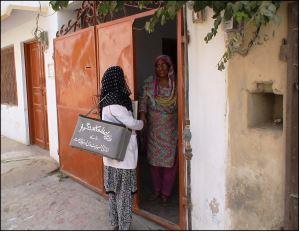 Health knocking at the door
Health knocking at the door
Pakistan’s national programme for family planning and primary health care, commonly known as the lady health workers programme, was established in 1994. The programme aims to empower women within their own communities serving as localized cadre and with flexible working hours to provide promotive, preventive, minor curative, referral support through the district health system and rehabilitative services for maternal and child health.The range of services offered by these health workers is appropriate and in accordance with their level of literacy. The programme not only acts as a catalyst for change but links ommunities with the health system that serves them.
Due to the success of the programme it was expanded in terms of the number and skill set of lady health workers in early 2000. During the same period the ‘Integrated Management of Childhood Illnesses’ (IMCI) strategy also gained momentum in Pakistan. Given the pivotal role of lady health workers in health service promotion within communities, they were involved in community IMCI activities through specialized training packages to reach each and every sick child in the communities covered by the programme.
The lady health worker is responsible for 22 different key functions related to maternal and child health – basic antenatal care, postnatal care, examination of neonates and growth monitoring of children. They are also responsible for tetanus toxoid vaccination for women of reproductive age and are also involved in routine Expanded Programme on Immunization activities. Through community IMCI, lady health workers have been able to ensure the combined treatment of major childhood illnesses and emphasize disease prevention through immunization and improved nutrition.
IMCI activities have been further reinforced by introducing another initiative of ‘Mother and Child Week’ which was conducted biannually with a focus to address 2 major killer diseases of children under 5 – diarrhoea and pneumonia. This intervention was later scaled up nationwide by 2010.
In Pakistan, the IMCI strategy has contributed in decreasing the infant mortality by 5% over the last 5 years, from 78 deaths per 1000 live births in 2002–2006 to 74 per 1000 live births deaths in 2008–2012.
Several evaluations of the programme have revealed and proven the fact that its beneficial is 2-fold. The implementation of community IMCI has improved the maternal and child health indicators in areas with coverage and the programme has also been simultaneously instrumental in empowering women within their respective sociocultural context.
The scope of work of a lady health worker is to:
- mobilize the community.
- liaise between formal health system and community.
- disseminate health education messages.
- register all families
- provide family planning services.
- contribute to improvements in skilled birth attendant cover.
- support other vertical programs (nutrition, EPI, tuberculosis, malaria, others).
- prevent and treat minor ailments.
- keep an information sheet about her respective catchment area.


